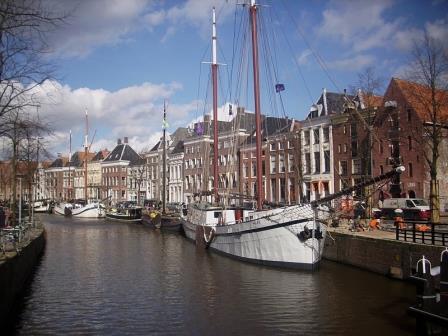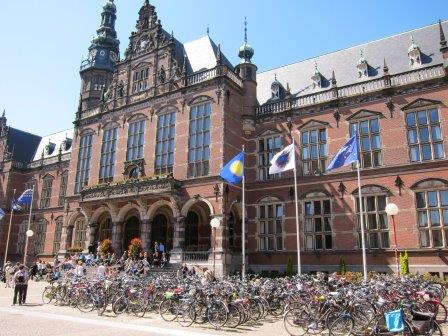|
New Scholarship Scheme Announced by Dutch Minister |
|
Written
on Tuesday, 05 August 2025 15:05
|
|
In a letter yesterday, addressed to the President of the Kamer der Staten-Generaal [Chamber of the States-General: the Dutch Parliament], Dutch Minister of Education Jet Bussemaker announced her intention to launch a new EUR5 million Scholarship programme aimed at boosting the internationalisation of Dutch Higher Education, including attracting “top talent” from amongst international students.
In her letter, Minister Bussemaker states that “this programme will focus primarily on international students from outside the EU, but will also be open to Dutch students (both incoming and outgoing).” Though more details are to announced shortly, Dutch Universities, in conversation with EUNiCAS, understand that some of the budget will be available for incoming EU [including British and Irish] students.
Nominally, the programme budgets for EUR5000 per student, half the cost of which will be borne by universities, for incoming students. In making this programme available, the Minister understands that “Top students from abroad will raise the level and improve the success rate, of Dutch students”.

There are not yet any details available of the basis on which these scholarships will be awarded. Details of the announcement [in Dutch] can be found on the Dutch Ministry of Education website here.
Please contact EUNiCAS for details, on
This e-mail address is being protected from spambots. You need JavaScript enabled to view it
and we will keep you up-to-date, as further details are released |
|
Dutch and Scandinavians Top Worldwide English Proficiency Rankings |
|
Written
on Tuesday, 05 August 2025 15:05
|
|
The Netherlands and the Scandinavian countries are the most proficient speakers of English globally, outside those countries where English is an official language, according to the EF Proficiency Index. Universities in these countries offer the highest numbers of degree programmes, at undergraduate and postgraduate level, that are taught through English.
Economies are becoming more globalised, work more delocalised, and information more decentralised. A shared language is a necessary tool when communication is no longer tied to geography. English is that tool, now more than ever. Educational institutions, driven by the demands of society, are increasingly embracing English language learning, and English, as a language of learning.

A high percentage of the students registered on the English-taught programmes in these countries are non-native speakers of English, particularly students from the Netherlands, Germany and the Baltic states. UK students studying on programmes in the Netherlands and Scandinavia report that most students their age are fluent in English. The biggest foreign language challenge facing UK students is to get an opportunity to practice their Dutch or Danish language skills.
At the other end of the European proficiency rankings are France and Italy, which have low English language proficiency rankings. English and Irish students in these countries, and Spain, report that a TEFL qualification proves a useful investment before they travel to study in Continental Europe, as English-language teaching can provide a useful income supplement while they are studying.
European English Language Proficiency Rankings
1. Sweden
2. Norway
3. Netherlands
4. Estonia
5. Denmark
6. Austria
7. Finland
8. Poland
Also:
12. Germany
18. Spain
21. Italy
22. France
For full results see http://www.ef.nl/epi/ |
|
Applications Still Open For Many Programmes |
|
Written
on Tuesday, 05 August 2025 15:05
|
|
Many programmes in Continental Europe Still Open: Alert List
The following programmes, all taught through English, are amongst those still accepting application for entry this year. Others are open, that are not listed here, so contact support@eunicas.com for an extended list in your area of interest. Note also that for many programmes, where published deadlines have passed, EUNiCAS might be able to encourage a university to consider 'late' applications.
|
|
Deadline |
Fee [Eur] |
|
| Medicine |
|
|
|
|
|
| MU Split |
CRO |
01-Jul |
|
7000 |
|
| Rigas Stradins U. |
LAT |
10-Jul |
|
8000 |
|
| MU Lodz |
POL |
15-Jul |
|
11000 |
|
| U. Debrecen |
HUN |
30-Jul |
|
11500 |
|
| U. Masaryk |
CZE |
30-Jul |
|
9100 |
|
| PJSU |
SVK |
30-Jul |
|
8500 |
|
| Pomeranian MU |
POL |
30-Jul |
|
9700 |
|
| MU Varna |
BUL |
18-Sep |
|
8000 |
* |
|
|
|
|
|
|
| Veterinary Science |
|
|
|
|
|
| Warsaw University LS |
POL |
11-Jul |
|
7600 |
|
| Lithuanian University LS |
LIT |
01-Jul |
|
6000 |
|
| Estonian University LS |
EST |
17-Jul |
|
7800 |
|
| Wroclaw University LS |
POL |
30-Aug |
|
8000 |
|
|
|
|
|
|
|
| Nursing |
|
|
|
|
|
| MU Lodz |
POL |
11-Jul |
|
5000 |
|
| U. Malta |
MAL |
24-Jul |
|
Nil |
|
|
|
|
|
|
|
| Physiotherapy |
|
|
|
|
|
| Rigas Stradins U |
LAT |
10-Jul |
|
8000 |
|
| U. Malta |
MAL |
24-Jul |
|
Nil |
|
|
|
|
|
|
|
| Psychology |
|
|
|
|
|
| University of Warsaw |
POL |
02-Jul |
|
3600 |
|
| U. Malta |
MAL |
24-Jul |
|
Nil |
|
| Touro College |
FRA |
30-Aug |
|
6000 |
|
|
|
|
|
|
|
| Liberal Arts & Sciences |
|
|
|
|
|
| Tilburg University |
NETH |
01-Jul |
|
1906 |
* |
| University of Groningen |
NETH |
01-Jul |
|
1906 |
* |
| Tallinn University |
EST |
01-Jul |
|
3000 |
|
| University of Freiburg |
GER |
15-Jul |
|
210 |
|
| University of Twente |
NETH |
15-Aug |
|
4036 |
* |
| University of Amsterdam [Feb] |
NETH |
01-Nov |
|
4015 |
* |
| University of Maastricht [Feb] |
NETH |
01-Nov |
|
3150 |
* |
|
|
|
|
|
|
| Arts & Culture |
|
|
|
|
|
| University of Maastricht |
NETH |
15-Jul |
|
1906 |
* |
|
|
|
|
|
|
| International Law |
|
|
|
|
|
| University of Maastricht |
NETH |
15-Jul |
|
1906 |
* |
| Hague UAS |
NETH |
30-Aug |
|
1906 |
* |
|
|
|
|
|
|
| International Relations & Politics |
|
|
|
|
| University of Maastricht |
NETH |
01-Aug |
|
1906 |
* |
| Hague UAS |
NETH |
30-Aug |
|
1906 |
* |
| University of Milan |
ITA |
01-Sep |
|
690+ |
|
| University of Warsaw |
POL |
19-Sep |
|
3000 |
|
|
|
|
|
|
|
| International Business |
|
|
|
|
|
| University of Twente |
NETH |
01-Jul |
|
1906 |
* |
| Saxion UAS |
NETH |
01-Jul |
|
1906 |
* |
| Rotterdam Business School |
NETH |
01-Aug |
|
1906 |
* |
| Avans UAS |
NETH |
01-Aug |
|
1906 |
* |
| Hanze UAS |
NETH |
15-Aug |
|
1906 |
* |
| Fontys UAS |
NETH |
15-Aug |
|
1906 |
* |
| SKEMA Business School |
FRA |
30-Aug |
|
7935 |
|
| Stenden UAS |
NETH |
30-Aug |
|
1906 |
* |
| NHTV Breda |
NETH |
30-Aug |
|
1906 |
* |
|
|
|
|
|
|
| Performing Arts |
|
|
|
|
|
| Institute of Arts Barcelona |
SPA |
01-Oct |
|
9950 |
|
|
|
|
|
|
|
| Fine Art |
|
|
|
|
|
| Prague College |
CZE |
01-Sep |
|
4250 |
|
|
|
|
|
|
|
| Information Technology/Comp Sci |
|
|
|
|
| U. Twente |
NETH |
01-Jul |
|
1906 |
* |
| U. Maastricht |
NETH |
01-Aug |
|
1906 |
* |
| Copenhagen Sch Design [Feb] |
DEN |
15-Oct |
|
Nil |
|
| Univ Coll N. Denmark [Feb] |
DEN |
05-Dec |
|
Nil |
|
|
|
|
|
|
|
| Game Design |
|
|
|
|
|
| Saxion UAS |
NETH |
01-Jul |
|
1906 |
* |
| Hanze UAS |
NETH |
15-Aug |
|
1906 |
* |
| Copenhagen Sch Design [Feb] |
DEN |
15-Oct |
|
Nil |
|
|
|
|
|
|
|
| Media & Entertainment Mngmnt |
|
|
|
|
|
| Stenden UAS |
NETH |
30-Aug |
|
1906 |
* |
|
|
|
|
|
|
| Engineering |
|
|
|
|
|
| University of Twente |
NETH |
01-Jul |
|
1906 |
* |
| Warsaw University Technology |
POL |
04-Jul |
|
900 |
|
| Fontys UAS |
NETH |
01-Aug |
|
1906 |
* |
| HAN UAS |
NETH |
17-Aug |
|
1906 |
* |
|
|
|
|
|
|
| Life Sciences |
|
|
|
|
|
| University of Leipzig [Physics] |
GER |
15-Jul |
|
184 |
|
| Avans UAS [Sustainable Energy] |
NETH |
01-Aug |
|
1906 |
* |
| University of Lund [Physics] Feb |
SWE |
15-Aug |
|
Nil |
|
| HAN UAS [Life Sciences] |
NETH |
17-Aug |
|
1906 |
* |
| Univ Tor Vergata [Pharmacy] |
ITA |
30-Aug |
|
1315 |
|
| JKU Linz [Biochemistry] |
AUS |
05-Sep |
|
Nil |
|
| U. Maastricht: BSc Science [Feb] |
NETH |
01-Nov |
|
3150 |
* |
| Uni di Bologna [Optometry] |
ITA |
15-Sep |
|
9000 |
|
|
|
|
|
|
|
| * Tuition Fee Loans Available |
|
|
|
|
|
|
Groningen among best cities in Europe to live and study |
|
Written
on Tuesday, 05 August 2025 15:05
|
|
The city of Groningen, in the Netherlands, has scored the highest in Europe for educational facilities, health care services and public spaces, according to the results of a survey released by the European Commission in October.
Citizens of Groningen are so satisfied with their city that this northern student city ranks third in Europe for quality of life, just behind Aalborg and Hamburg. Furthermore, it received the highest satisfaction score regarding cleanliness, public spaces and the feeling of safety, leaving other popular Dutch cities like Amsterdam and Rotterdam behind.

The vast majority of Groningen citizens surveyed agreed that the presence of foreigners is good for the city. Groningen also scored among the highest in Europe for green spaces, air quality and trust in fellow citizens.
British students and lecturers studying and working in Groningen share their thoughts on the results. Jonathan Hurry, Fine Art student at Hanze University of Applied Sciences, Groningen (Hanze UAS), remarks, “it’s a good city, a student city, there are lots of interesting things going on”.
The first impression that Hanze UAS student (International Communication) Jack Gowans, from Newcastle, had was that “the city looks beautiful”, and he mentioned, “it reminded me a lot of older parts of towns I’d visited in England, like York”.
Besides enjoying the classic atmosphere, Jack is very positive about the city’s educational facilities. “One of my favourites is the library where you can rent your books online and collect them from the front desk, and access standard and high-performance computers for media work”.
According to Hanze UAS student (International Business and Management Studies) Jack Lancaster, from Sheffield, not only the city’s atmosphere and education facilities are good. “The (university) sports facilities are perfect for students and extremely cheap” he says. With unlimited access to the student sports centre – including a fitness club and pool – for less than €150 per year, it is definitely affordable to say the least. |
|
University of Groningen Announces Details of New Liberal Arts & Sciences Degree |
|
Written
on Tuesday, 05 August 2025 15:05
|
|
The University of Groningen has now announced details of its much anticipated Liberal Arts & Sciences [LAS] degree, taught through English. Details here. The university is one of several Dutch universities, ranked in the world's top 100 universities, to offer this degree option. The LAS programmes are proving very popular with UK and Irish students, who are applying to join them in increasing numbers, drawn by the opportunity to study a wide range of subjects in the first year before taking a major [specialising] in one subject, from the second year onwards.
In the Groningen LAS programme [run at University College Groningen], students will be able to specialise in one of the following areas:
Health and Life Sciences, which provides a comprehensive understanding of mechanisms underlying the normal development and function of humans, and of mechanisms causing disease.
Philosophy, Politics and Economics: modules include History of Philosophy, Philosophy of Science, Ethics, Logic, Political Science, International Relations, Microeconomics, Markets & Regulation and International Macroeconomic Theory & Policy.
Cognition and Behaviour: modules include Cognitive Psychology and Neuroscience, Social Environment & Behaviour, History and Philosophy of the Mind and Society,, Social Cognition, Neuropsychology, Cognition and Attention, Gerontology and Perception. The topics can be explored further in relation to the three research themes.
Reflecting on Culture: modules include Cultural History, Cultural Analysis, a chosen art medium (film, television, literature, theatre and music), a chosen historical period, the methods and methodology of the Humanities.
Physics and Energy: this major includes a broad spectrum of physics modules in topical fields, including magnetism, electricity, mechanics and relativity, thermodynamics and the structure of matter. Electives are offered in the fields of energy and sustainability.
As in all of the Liberal Arts & Sciences programmes, at Groningen there is a competitive selection procedure. After checking that your High School Diploma grades [A-Level/Leaving Cert/IB etc] meet their requirements, the university will require students to complete four tasks: an interpretative essay; analytical and logical reasoning tests; group dynamics reflection task; video letter. Students who score well in these tasks will be invited to an interview.
Applications open on 6th January and close on 1st June 2014

|
|




 Join us on Facebook
Join us on Facebook